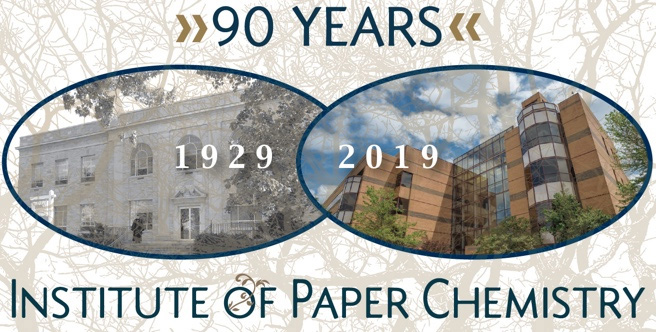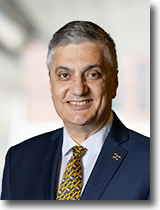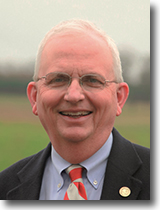90th Anniversary Celebration

Building the Future with Renewable Bioproducts Renewable Bioproducts Institute Celebrates 90th Anniversary
The Renewable Bioproducts Institute is celebrating its 90th anniversary on October 17-18, 2019 at the Georgia Institute of Technology. Alumni, friends, and the Georgia Commissioner of Agriculture, Gary Black, will gather to celebrate 90 years of contributions to the forest products industry.
Since its inception as the Institute of Paper Chemistry in the fall of 1929, the research institute continues to advance the science and technology in renewable resources.
“The legacy of IPC is integral to the mission of RBI,” said Meisha Shofner, Interim Director of the Renewable Bioproducts Institute (RBI) at Georgia Tech. “The technical foundation provided by the pulp and paper industry has shaped the bioproducts research that drives the Institute today as we consider how to use natural resources to produce more sustainable chemicals, materials, and products to address societal needs.”
Today, RBI delivers innovation in converting biomass into value-added products, developing advanced chemical and bio-based refining technologies, and advancing excellence in manufacturing processes. The three strategic thrusts of the Institute are paper, packaging and tissue; biochemicals and fuels; and biocomposites and nanocellulose.
But that’s not how it started. Ninety years ago, RBI was the Institute of Paper Chemistry (IPC), founded in October 1929 at Lawrence College in Appleton, WI. That original Institute was created to provide science, technology, and education in support of the pulp and paper industry which, at the time, was a rapidly growing sector of the economy.
There were delays in starting the school, primarily financial in nature; founders estimated it would require $200,000 to $250,000 to construct a building, purchase equipment, and hire professors. The president of Lawrence College, Henry M. Wriston, pushed the idea forward; along with Ernst Mahler, who was then the vice president and general manager of the Kimberly-Clark Corporation in Neenah, WI. Mahler — then known for research in cellulose chemistry — had emigrated from Austria to work in the U.S. and establish one of the first research labs in the industry. He was able to acquire financial support from 19 pulp and paper companies that encompassed 90 percent of the state's paper industry and, in 1929, IPC was created.
The curriculum at the newly formed IPC applied a liberal arts philosophy to the teaching of science and technology. Faculty encouraged imagination and creative thinking, grounded in thorough knowledge of fundamental research procedures. With a rich tradition upon which to build and a progressive attitude toward evolving technologies and practices, the Institute flourished as it was led by a succession of individuals who preserved its integrity while allowing enough flexibility to adapt to the changing times.
With the boom of information technology in the late 1970s and early 1980s, the Institute’s board of trustees approved a plan to relocate to the Georgia Tech campus in Atlanta, Georgia. IPC then became the Institute of Paper Science and Technology (IPST). The move to Atlanta aligned the Institute with a premier research university with significant strengths in engineering and science, including the relatively new computer science and technology field.
The Institute became one of Georgia Tech’s interdisciplinary research institutes. The merger in 2003 meant that paper science and engineering fellowships were continued to be offered by IPST, but degrees were managed by the academic schools at Tech. The integration was declared complete in 2004.
For the next decade, IPST built on the rich traditions of the past and continued to evolve as tremendous changes took place in economics, manufacturing, environmental policies, and industry objectives. The explosion of research technology opened even more doors to advances the paper industry never imagined.
That evolution would entail a new name and an expanded scope of work and research in May 2014. The move enabled the Institute to acknowledge its broader focus in the area of bioproducts, which had included research in the areas of pulp and paper, chemicals and materials, and manufacturing. Thus, the Renewable Bioproducts Institute was born.
Also, in May 2014, RBI received a $43.6 million gift from the Institute of Paper Chemistry Foundation (IPCF). This major grant, one of the single largest gifts in Georgia Tech’s history, affirmed the Institute’s position as a leading driver of the future of the forest bioproducts industry. That endowment currently supports approximately 30 students who advance the research mission of RBI through their faculty directed research.
Today in the year 2019, RBI has more than 1500 alumni and empowers students from different backgrounds and scientific interests to address interdisciplinary research needs. The Institute works closely with industrial partners; discovers inventive technical solutions to society’s challenges, and trains future leaders to ultimately create an efficient, competitive, and profitable bioproducts industry from nature’s resources.
Event Recap
On October 17 and 18, the Renewable Bioproducts Institute celebrated the 90th anniversary of the Institute of Paper Chemistry at the Georgia Institute of Technology.
The celebration to recognize the many contributions to the forest industry drew former Paper Institute presidents, alumni, professors, students, and notably, Gary Black, the Georgia Commissioner of Agriculture. The speaking events included a retrospective of 90 years and the future of the paper industry, history of the museum’s pilot paper machine, and the importance of forest products for Georgia and the United States.
Commissioner Black provided thoughtful insights about crops in Georgia and the health of our forests. Jim Ferris, Ph.D. (MS Class of ’69; PhD ’74), former president of the Institute of Paper Science and Technology, was in attendance of the celebration and called it an “excellent event,” and that he left “feeling very positive about the future.”
The celebration also included letters from former faculty and friends that were unable to attend but sent their congratulation letters that were shared with the crowd. This included letters from Nick Triantafillopoulos (Ph.D. ’89), John McKibbon (MS ’87; Ph.D. ’94), Art Ragauskas and Ted Wegner.
A highlight of the celebration was the tour of the Robert C. Williams Museum of Papermaking. It was an interactive tour with Commissioner Black getting his hands wet making paper and touring the museum. In addition, tours of the Institute’s innovative research were provided at the Manufacturing Related Disciplines Complex and the Marcus Nanotechnology building.
The celebration concluded after the tours on the evening of October 18 with a reception and dinner.
“This celebration was a special opportunity to recognize the people and technical contributions of the Institute of Paper Chemistry and its successor organizations, the Institute of Paper Science and Technology and the Renewable Bioproducts Institute,” says Meisha Shofner, Interim Director of the Renewable Bioproducts Institute at Georgia Tech. “As the industry has changed and evolved over 90 years, the Institute has been a reflection of those changes while continuing to produce innovative research and train students to pursue careers in the bioproducts field. We were honored to share this occasion with our community and look forward to celebrating again on the 100th anniversary.”
Speaker Biographies
Camilla Abbati
Senior Analyst and Product Manager - Fisher International
cabbati@fisheri.com
A Retrospective on 90 Years and the Future of the Paper Industry

Camilla Abbati is a Senior Analyst and Product Manager for Fisher International, a leading business intelligence and strategy consultant to the pulp and paper industry. Her activities enhance and grow Fisher International’s product portfolio as well as support consulting projects.
Camilla has more than 10 years of experience in project development and process design. Her areas of expertise include process simulation, equipment design, capital cost estimation, and investment risk analysis. Before joining Fisher International, Camilla was process engineer expert for Rhodia / Solvay Group in Brazil, having the opportunity to design and execute multi-million-dollar projects in Latin America and Europe.
Camilla holds Bachelor’s and Master’s degrees in Chemical Engineering from UFSCar and UNICAMP (Brazil), and recently concluded her PhD at North Carolina State University, Department of Forest Biomaterials, with a minor in Business. Her research interests are related to approaches and methodologies to aid investment decisions at early stages of design, such as techno-economic assessment and risk analysis, for the pulp and paper and biobased industries.
Chaouki Abdallah
Executive Vice President of Research - Georgia Tech
ctabdallah@gatech.edu

Chaouki T. Abdallah is the Executive Vice President for Research (EVPR) at the Georgia Institute of Technology. As a direct report to President G.P. “Bud” Peterson and a member of the president’s cabinet, the EVPR serves as chief research officer for the Institute. This position provides overall leadership for the research, economic development, and related support units within Georgia Tech.
Abdallah began his college career at the Faculté d’ingénierie of the Université Saint-Joseph in Lebanon, then obtained a bachelor of engineering (B.E.) degree from Youngstown State University in 1981, and a M.S. and Ph.D. in electrical engineering from Georgia Tech in 1982 and 1988, respectively. He joined the Electrical and Computer Engineering (ECE) Department at the University of New Mexico (UNM), where he served as professor of electrical and computer engineering. Between 2005 and 2011, Abdallah was the ECE department chair, and he served as provost and executive vice president of academic affairs at UNM from 2011 to 2016. In 2017-18, he served as acting president, interim president, and finally the 22nd president of UNM. On September 1, 2018, he joined Georgia Tech as its EVPR.
Professor Abdallah was the first recipient of the ECE Department’s Lawton-Ellis Award for combined excellence in teaching, research, and student/community. He also received the UNM School of Engineering senior research excellence award in 2004, and was the ECE Gardner-Zemke Professor between 2002 and 2005. He received the 2017 UNM Staff Hero award for his “advocacy for staff during difficult financial times and for his support of Staff Council.”
He has published eight books (three as co-editor and five as co-author) and more than 300 peer-reviewed papers, and generated more than $9 million in external funding. As provost, Abdallah assembled a team to improve student success focusing on underprepared and underrepresented students. Within seven years, under his leadership, UNM increased the first-year retention rate by 8 percent, the four-year graduation rate by 125 percent, the five-year graduation rate by 8 percent, and the six-year graduation rate by 15 percent, while closing the retention-achievement gap and narrowing the graduation-achievement gap. He also shepherded the design and implementation of an honors college that has since increased the number of high-achieving students at UNM by more than 20 percent. In addition, he led the development and implementation of a long-range UNM academic plan and initiatives in 2011.
Professor Abdallah conducts research and teaches courses in the general area of systems theory with a focus on control, communications, and computing systems. His research has been funded by the National Science Foundation, the Air Force Office of Scientific Research, the U.S. Naval Research Laboratory, national laboratories, and various companies. He served as the general chair of the 2008 CDC, the premier IEEE conference in decision and control. Abdallah, who is fluent in English, French, and Arabic, is a senior member of IEEE and a recipient of that organization’s Millennium Medal.
Gary W. Black
Commissioner of Agriculture - Georgia Department of Agriculture
www.agr.georgia.gov

For over 38 years Gary W. Black has championed sound state and federal policies impacting food safety, science-based environmental stewardship and agricultural marketing. Now beginning his third term, Commissioner Black remains committed to fostering growth in Georgia's number one industry.
Black's love of agriculture was first sparked on his family's farm in Commerce. He became an active member of the Commerce FFA and was elected State President of the Georgia FFA Association in 1975. Black then attended the University of Georgia's College of Agricultural and Environmental Sciences where he earned a degree in Agricultural Education and interned with United States Senator Herman Talmadge and the Senate Committee on Agriculture, Forestry, and Nutrition.
Upon completing his degree at the University of Georgia, Black began his career at the Georgia Farm Bureau coordinating leadership development programs for young farmers. In 1989, he was named President of the Georgia Agribusiness Council. While at GAC, he was instrumental in establishing the AgriTrust of Georgia insurance program, agriculture promotions during the Centennial Olympic Games, and developing a strong reputation for agriculture advocacy in the legislative and regulatory arena.
Black was first elected to serve as the Commissioner of Agriculture in November 2010. He has improved career paths for employees and established high standards for customer service. Under his leadership, the Department’s food safety and animal health regulatory programs have received national acclaim and the Georgia Grown brand's economic impact can be seen in every corner of the state and beyond. His innovative vision to strengthen school nutrition has resulted in expanded markets for Georgia farmers and improved the quality of nutrition for Georgia students. In recognition of these successes, Commissioner Black was named Georgia Trend Magazine's Georgian of the Year in 2017.
Commissioner Black and his wife Lydia continue to raise commercial beef cattle on his family farm in Commerce. Both of his adult children work in the agriculture and food industries. The Blacks are active in the Sunday school and music ministries of Maysville Baptist Church.
James L. Ferris
President - IPST (retired)

Jim was born and raised in Washington State, and received his BS degree in Chemical Engineering from the University of Washington in 1966. He then began a 30-year career with Weyerhaeuser Company with leaves of absence for graduate school [ 5 years] and military service [3 years].
After receiving his Doctorate from the Institute of Paper Chemistry in 1974, he rejoined Weyerhaeuser and served in various technical positions in research and the Pulp Business. In 1988, Jim was appointed VP-Research for the paper group of Weyerhaeuser and served on the Research Advisory Committee of IPST.
In 1996, he left Weyerhaeuser to join The Institute of Paper Science and Technology in Atlanta, GA where he served as President and Trustee.
Virginia Howell
Director, Robert C. Williams Museum of Papermaking - Georgia Tech
virginia.howell@rbi.gatech.edu
History of the Robert C. Williams Museum of Papermaking

Virginia Howell is the director of the Robert C. Williams Museum of Papermaking. Prior to this position she served as the Education Curator for the museum since 2013. Howell has a Master’s Degree in History from the University of Mississippi, and a B.A. in History and American Studies from Miami University, Oxford, Ohio. She has been a museum educator for twenty years: beginning at Reynolda House, Museum of American Art in Winston-Salem, NC, as program coordinator at the North Carolina State Capital, and ten years at Cape Fear Museum of History and Science in Wilmington, North Carolina. As Education Curator at the Robert C. Williams Museum of Papermaking, she expanded programming for school audiences, increased outreach opportunities to Georgia Tech students and faculty, and developed a homeschool workshop series that explores the many different uses of paper. In her role as Director of the museum, she seeks to support the mission of the museum to “collect, preserve, increase, and disseminate knowledge about papermaking¬—past, present, and future.”
Chris Luettgen
Professor of the Practice and Associate Director, RBI - Georgia Tech
chris.luettgen@rbi.gatech.edu

Luettgen has 25 plus years of industry experience, with Scott Paper and Kimberly-Clark Corp., where he most recently served as senior research and engineering manager for the Kimberly-Clark Professional business sector. He has held positions in product development and innovation as well as in capital project management and manufacturing facility leadership.
For several years, Luettgen has served on the RBI Industry Board of Advisors, and he is the current Chairman of the Board of the Technical Association of the Pulp & Paper Industry. He earned his bachelor's degree in Paper Engineering at Western Michigan University (’85), his master’s degree at the Institute of Paper Chemistry, Appleton, WI (’87), and his Ph.D. at the Institute of Paper Science and Technology - now the Renewable Bioproducts Institute at Georgia Tech (’91).
He rejoined Georgia Tech in November 2014 as a Professor of the Practice in the School of Chemical and Biomolecular Engineering, and Associate Director of Pulp and Paper at RBI. He also serves as Director of Industry Strategic Partnerships in the Georgia Tech Professional Education Division.
Areas of interest include: Recycled fiber, renewable cellulosic feedstocks, tissue manufacturing and converting and manufacturing leadership / operations excellence
Tom Rodencal
President - Rodencal and Associates
Miniature Paper Machines A Story Three Years in the Making and Still Going!

Thomas E. Rodencal is president of Tom Rodencal & Associates, a consulting company serving the paper and allied industries. He has over 45 years of experience in mill operations and corporate project support. He has a BS in Paper Engineering from SUNY College of Forestry and Environmental Science. He has worked for several large paper companies including Hammermill Paper, International Paper, Georgia-Pacific, and Domtar Paper. His last position was with Nalco Company as an Industry Technical Consultant. Mr. Rodencal has worked with many grades of paper including specialty, fine, bleached and unbleached board, coated groundwood and coated free sheet, as well as tissue and towel. The consulting practice offers support to manufacturing operations, efficiency improvement studies, capital upgrade studies, training and support for due diligence studies.
Tom is a TAPPI Fellow and recipient of the TAPPI Distinguished Service Award. Since retirement from full time work, he has been doing research on papermaking history, with a focus on the history of old pilot and miniature machines. He published the history of the TAPPI Paper and Board Division for the TAPPI 100th Anniversary event in 2015.
Ronald Rousseau
Professor and C.J. “Pete” Silas Endowed Chair Emeritus, ChBE - Georgia Tech
ronald.rousseau@chbe.gatech.edu

Ronald W. Rousseau is Professor and C.J. “Pete” Silas Endowed Chair Emeritus at the Georgia Institute of Technology, where he served for more than 26 years as chair of the School of Chemical & Biomolecular Engineering. While serving as school chair, he also served two separate terms as interim director of the Institute of Paper Science and Technology. Prior to moving to Georgia Tech, he was a faculty member at North Carolina State University.
Dr. Rousseau holds B.S., M.S. and Ph.D. degrees in Chemical Engineering from Louisiana State University and a Docteur Honoris Causa from L’Institut National Polytechnique de Toulouse. He received the Founders Award, the Warren K. Lewis Award, and the Gerhard Award in Separations from the American Institute of Chemical Engineers. He is a Fellow of both AIChE and the American Association for the Advancement of Science and a member of the LSU Engineering Hall of Distinction.
Dr. Rousseau is co-author of Elementary Principles of Chemical Processes (now in its fourth edition) and editor of the Handbook of Separation Process Technology. His research has explored separation processes, with an emphasis on the use of crystallization in separation and purification processes.
Meisha Shofner
Associate Professor, MSE - Georgia Tech
Interim Director - RBI
meisha.shofner@rbi.gatech.edu

Shofner joined the faculty following post-doctoral training at Rensselaer Polytechnic Institute. She received a bachelor’s degree in Mechanical Engineering from the University of Texas at Austin and a Ph.D. in Materials Science from Rice University. At Georgia Tech, Shofner’s research focuses on designing hierarchically structured polymeric materials for structural and functional applications through approaches such as novel processing, polymer crystallization and nanoparticle assembly and templating. In her current research, these methods have been employed preferentially to biobased materials. Shofner’s research has been recognized with the Ralph E. Powe Junior Faculty Enhancement Award from Oak Ridge Associate Universities and the Solvay Advanced Polymers Young Faculty Award.



